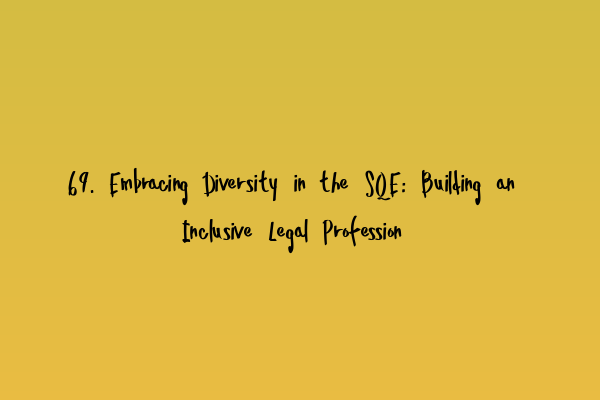69. Embracing Diversity in the SQE: Building an Inclusive Legal Profession
When it comes to the Solicitors Qualifying Examination (SQE), embracing diversity is not just a buzzword but a crucial step towards building an inclusive legal profession. The SQE, with its revamped format and updated curriculum, not only focuses on testing legal knowledge and skills but also aims to foster inclusivity and encourage representation from all walks of life. In this blog post, we will explore the importance of diversity in the SQE and how it contributes to the growth and development of the legal profession.
Why is Diversity Important in the SQE?
Diversity plays a fundamental role in the legal profession as it brings a range of perspectives, experiences, and ideas to the table. By including individuals from diverse backgrounds, the SQE reflects the real-world challenges and complexities that legal professionals face. It helps in challenging preconceived notions and biases, leading to better problem-solving and decision-making.
Furthermore, embracing diversity in the SQE allows aspiring solicitors from underrepresented communities to have a fairer shot at entering the legal profession. It helps to break down barriers and promotes social mobility, ensuring equal opportunities for all candidates.
The Benefits of Diversity in the Legal Profession
Diversity in the legal profession has several benefits, both for individuals and the overall legal ecosystem. Here are some key advantages:
- Fosters Innovation: A diverse legal profession encourages innovative thinking and creative problem-solving. Different perspectives lead to a broader range of ideas and solutions, fostering an environment that thrives on innovation.
- Enhances Decision-Making: When diverse voices are heard and valued, decision-making becomes more comprehensive and effective. Diverse legal teams are better equipped to consider various angles and anticipate potential risks or opportunities.
- Improves Client Service: Clients come from all walks of life, and having a legal profession that is representative of the population ensures that diverse client needs are understood and catered to effectively.
- Increases Public Trust: A diverse legal profession builds public confidence and trust. When people see a legal system that reflects and respects their values, they are more likely to believe in the fairness and integrity of the system.
Challenges in Embracing Diversity in the SQE
While the SQE aims to be inclusive, there are challenges that need to be addressed to ensure that diversity is truly embraced:
- Accessible Preparation: Access to SQE preparation materials and resources should be affordable and easily accessible for candidates from all backgrounds. To overcome this challenge, initiatives like Strategies to Tackle SQE MCQs: Mastering Multiple-Choice Questions can provide valuable guidance and support.
- Fair Assessment: The SQE assessment process should be designed in a way that avoids any biases and ensures a fair evaluation of candidates’ abilities. Understanding the SQE2 format and practicing with scenario-based questions, as explored in Scenario-Based Questions in SQE2: Become a Master Problem-Solver, can aid candidates in this aspect.
- Representation: Efforts should be made to increase representation from underrepresented groups, including individuals from diverse ethnic backgrounds, LGBTQ+ community, individuals with disabilities, and other marginalized communities. This can be achieved by promoting awareness and providing support through resources such as Demystifying the SQE Exam Pattern: Knowing What to Expect and SQE Strategies: Proven Tactics to Ace the Solicitors Qualifying Examination.
- Inclusive Training: Training providers should offer inclusive learning environments that accommodate the diverse needs of candidates. Incorporating case studies and practical examples, as discussed in SQE Case Studies: Applying Knowledge in Real-Life Scenarios, can enhance the learning experience.
Conclusion
Embracing diversity in the SQE is not just a checkbox exercise, but a crucial step towards building an inclusive legal profession. By ensuring equal opportunities for candidates from all backgrounds, the legal profession becomes stronger, more innovative, and more representative of the society it serves. Initiatives that promote diversity, such as accessible preparation resources, fair assessment practices, increased representation, and inclusive training, play a vital role in achieving this goal. Let us embrace diversity and pave the way for a more inclusive and diverse legal profession through the SQE.
